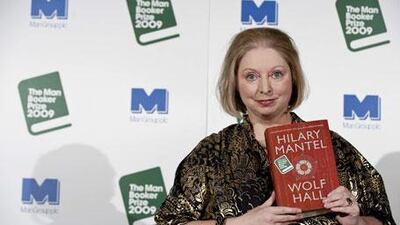Famously, the Orange literary award for female writers was dreamed up by the author Kate Mosse as a reaction to an all-male Booker Prize shortlist. Since 1996, it's had to weather allegations of being sexist itself, but the original idea - to ensure women were accurately represented at book prizes - has had repercussions way beyond Mosse's awards. The incumbent of the Booker Prize is Hilary Mantel, and three out of the last four winners have been women. It's a similar story at the Costa Book Awards. Admittedly, the controversies continue - AS Byatt refuses to be considered for the Orange Prize for Fiction as she also considers it sexist - but it's become a fascinating fixture in the awards calendar.
Mantel is also on the 2010 Orange Prize longlist that was announced last week, as is the author she beat to the Booker last October, Sarah Waters. Some commentators have suggested such cross-pollination means Mosse's original concept is no longer relevant. But the Orange Prize is one of the most prestigious and representative prizes on the circuit purely because, unlike the Booker, it doesn't exclude authors based on where they live. On the 2010 longlist, there are writers born in America, South Africa, Morocco, Trinidad and Somalia. All female authors who write in English are eligible for inclusion.
All of which means there are some delicious contrasts in this year's longlist. Mantel is clearly - and rightly - the critics' choice for Wolf Hall, her richly evocative historical novel based on Thomas Cromwell. And yet for a few weeks - until the 20 books are whittled down to a shortlist on April 20 - she will share the same space as Rosie Alison's The Very Thought of You. The British author's intriguing tale of a wartime evacuee, somehow, did not receive a single newspaper review when it was published - negative or positive. Her inclusion, though, is part of a noble Orange Prize tradition of ignoring prevailing trends: the second-ever winner, Anne Michaels' Fugitive Pieces, had sold a mere 800 copies before taking the prize.
Daisy Goodwin, author and this year's chair of judges, is certainly right when she says they've chosen "a muscular, original and pleasurable longlist that will appeal to all kinds of readers". The muscular comes in the shape of work from the likes of MJ Hyland; her This Is How is a brilliantly claustrophobic investigation into the mind of a killer. Amanda Craig's Hearts and Minds delves uncomfortably deep into London's immigrant population of cleaners, au pairs and cab drivers. It's also pleasing to see a thriller - not a genre traditionally well represented at literary prizes - in the shape of Attica Locke's Black Water Rising.
Locke's book could also be regarded as an example of the "original" books that Goodwin speaks of: it's one of the seven debut novels in this longlist. Of these, Laila Lalami's Secret Son sums up just how international in scope the prize is: the Moroccan author's protagonist is a teenage boy who swaps the slums of Casablanca for its more glittering luxuries. Similarly, Nadifa Mohamed was born in Somalia, educated in the UK, and has written a fine first novel following a boy's search for his father in 1930s Eritrea, Sudan, Egypt and Palestine.
Much has been made of Goodwin's criticisms, too: she bemoaned how "grim" much current women's fiction seems to be. Such a sound bite was possibly a criticism of the hundreds of books she has had to read in this process rather than the ones that made the longlist. Still, even those she might have filed under "pleasurable" often have troubling subject matter. The former Orange prize winner Andrea Levy takes on slavery, heartbreak and racism in The Long Song, but it's nevertheless a vibrant and gripping tale of 19th-century Jamaica. Similarly, Sadie Jones's Small Wars intricately captures the shattering effect of war on families, but in a propulsive and accessible way. Kathryn Stockett's The Help zeroes in on black maids suffering, because of their colour, in 1960s Mississippi - but in a sassy and humorous way.
And if nominations for solid books from Barbara Kingsolver, Maria McCann and Waters are not surprising, the omission of Rose Tremain certainly is. She won't get the chance to win the Orange Prize for successive books after her success with The Road Home in 2008, which is strange, seeing as Trespass is just as enthralling. But then, it's also much darker. Maybe Goodwin read Trespass on a day when she really fancied a cheerier book. So by that rationale, Eleanor Catton has to have a great chance. She's a debut novelist from New Zealand, and The Rehearsal is a sharp, savagely funny evocation of teenage life that playfully juxtaposes a teacher-pupil relationship with the drama school's theatrical adaptation of the same story. Try calling that grim.
For a full list of nominees, go to www.orangeprize.co.uk.

